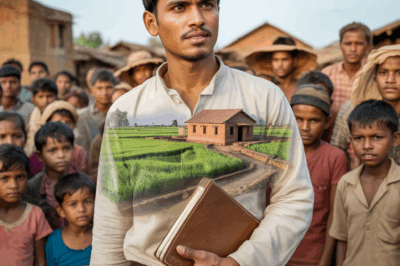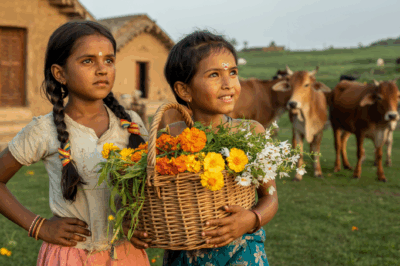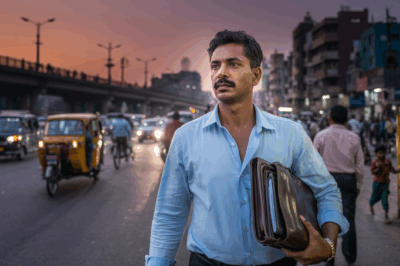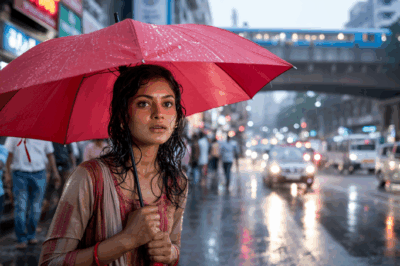Aarav left his small office building in Mumbai with a sigh of relief as the workday ended. The sky was already painted in heavy gray clouds, a sure sign that another monsoon downpour was on its way. He adjusted the strap of his bag on his shoulder, feeling the weight of unfinished files, and began walking toward the station.
The city was buzzing as always. Vendors shouted prices of roasted peanuts and steaming samosas, rickshaws honked impatiently, and office workers like him hurried in every direction. The air was sticky with the promise of rain, and Aarav knew he would not make it home dry.
He stopped for a moment to buy a cup of cutting chai from a roadside stall. The steam rose in delicate swirls, warming his face as he took a sip. Around him, strangers gathered under the small tin roof of the stall, each one sharing the same unspoken wish that the rain would hold back just a little longer.
But the sky broke open within minutes. Thick sheets of rain fell from above, pounding on the tin roofs, bouncing off umbrellas, and forming rivulets that raced down the crowded street. Aarav quickly pulled his umbrella from his bag, opened it, and stepped back into the chaos.
The road to the station was already flooded ankle-deep. He grimaced as his shoes filled with water, but he pressed forward, weaving through the crowd. His focus was on getting home, on drying off, on escaping the noise of the city that only seemed louder in the rain.
Then he noticed her. A young woman, no older than him, stood by the edge of the street holding a half-broken umbrella. Beside her was an elderly man clutching her arm for balance. The umbrella barely covered her, let alone the two of them. Rain poured down her shoulders and soaked the man’s kurta, but she held on, determined to shield him as best she could.
Aarav slowed his steps, watching them. Something in her persistence struck him deeply. Around them, people rushed past, each focused on their own struggle, but she remained rooted, unwilling to abandon the man.
He hesitated for a moment. Then he stepped closer, raising his own umbrella to extend its cover. “You both can stand here,” he said, his voice almost lost in the storm.
The woman turned, surprised. Her eyes met his, and for a brief moment, the chaos of the street seemed to quiet. “Thank you,” she said softly, her voice carrying both exhaustion and gratitude.
Together, the three of them began moving slowly toward the station. Aarav walked on one side, holding the umbrella high enough to cover all of them. The woman steadied the old man, who shuffled carefully through the puddles. The rain lashed against their legs, but at least their heads and shoulders were dry.
The old man coughed lightly, and the woman adjusted her grip. Aarav glanced at her and offered a reassuring smile. She returned it faintly, as though surprised by this small kindness from a stranger.
As they moved, conversation began naturally. Aarav asked if the old man lived nearby, and the woman explained that he was her neighbor. She had been helping him get groceries when the rain caught them. Aarav nodded, admiring her sense of responsibility.
Their words were simple, but the tone carried something more. In the middle of honking cars, vendors shouting, and water splashing under hurried footsteps, their voices formed a pocket of calm. They spoke of train delays caused by the monsoon, of favorite food stalls in the market, of memories of past rains when as children they had played in the streets without fear of getting sick.
The old man smiled faintly at their conversation, occasionally adding a word or two about how different the city felt when he was young. Aarav listened with interest, realizing he had never taken the time to hear such stories from strangers before.
They stopped under a shop awning to catch their breath. The rain showed no sign of easing, but there was laughter now, hesitant at first, then more natural. Aarav found himself laughing at the way the old man joked about his umbrella being “more holes than cloth.” The woman laughed too, her eyes bright despite her damp hair clinging to her face.
When they resumed walking, the flooded street no longer felt like an obstacle but part of the shared journey. Aarav noticed how his own irritation from earlier—the wet shoes, the heavy bag—had faded completely. In its place was a quiet sense of connection.
As they reached the station, the old man thanked Aarav sincerely. “Not many stop to help these days,” he said, his voice raspy but warm. Aarav felt a lump in his throat and simply nodded.
The woman turned to him, adjusting her umbrella. “You didn’t have to stop, but you did. Thank you.” Aarav shrugged lightly. “It was nothing. Just the right thing to do.”
They stood for a moment under the station entrance, the crowd streaming around them. Aarav thought about how ordinary the moment was, yet how extraordinary it felt.
The woman smiled once more before guiding the old man toward the ticket counter. Aarav watched them disappear into the crowd, the sound of the rain echoing off the metal roof above.
He lingered for a few moments, absorbing the quiet calm that had settled inside him. The world outside was still chaotic, wet, and loud, but something within him had shifted. He realized that kindness was rarely planned. It happened in moments like these, when life gave you a choice to look away or to act.
That night, as he finally reached home and removed his soaked shoes, Aarav replayed the walk in his mind. He knew he might never see the woman or the old man again, but the memory of their shared umbrella would stay with him.
Over the next few days, he found himself noticing opportunities he had once ignored. A colleague struggling with files received his help. A neighbor was greeted with a warmer smile. A child in the street was offered his umbrella for a short distance. Each act reminded him of the rain-soaked evening when he learned that even in the busiest city, strangers could pause and create a bond of humanity.
Weeks later, as another storm swept across Mumbai, Aarav stood once again under a shared umbrella—this time with a colleague whose bag had ripped open in the rain. He realized then that the lesson from that first evening was not about a single act, but about a way of seeing the world differently.
Life was crowded, noisy, and often indifferent, but within it lay countless chances to connect, to care, and to discover the extraordinary hidden within the ordinary.
Aarav would always remember that walk not as a story of rain or inconvenience, but as a quiet revelation that kindness, even when small, had the power to transform.
News
How a Middle-Aged Woman Rediscovered Her Passion, Reconnected With Her Dreams, and Transformed the Routine Life of Her Family
Anita woke up to the sound of birds singing outside her window. The morning sun filtered through the curtains, casting…
How a Young Villager’s Determination to Modernize His Hometown Transformed Lives, Traditions, and the Dreams of an Entire Community
Ravi woke up before sunrise, the faint glow of dawn illuminating his small room. He could hear roosters crowing and…
How a Small Village Friendship Between Two Girls Unfolded Into a Story of Trust, Courage, and Life-Changing Decisions
The sun rose over the quiet village, painting the small mud houses and green fields in golden light. Meera tightened…
Between Love, Respect, and Conflict, One Bride Learns Lessons of Patience and Family Secrets That Change Everything Forever
Meera stepped into her new home for the first time, her suitcase in hand and a mixture of excitement and…
Esha Deol’s Ultimate Sacrifice for Father Dharmendra Amid Health Scare – Fans Emotional
The streets of Delhi glowed under the fading sunlight as Rajiv hurried home from his office job. The metro was…
A Young Woman’s Unexpected Journey Through Struggles, Love, and Hope That Changed Her Destiny in the Heart of Mumbai
The rain had been falling in Mumbai for three straight days, and the city seemed both alive and exhausted at…
End of content
No more pages to load












